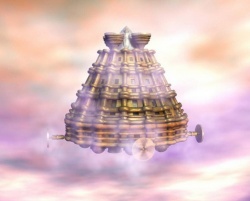Vimāna Vatthu
Vimāna Vatthu the sixth book of the Khuddaka Nikāya. It describes the splendour of various celestial abodes belonging to different Devas, obtained by them as reward for some meritorious act performed in a previous Life. The stories were learnt from the Devas themselves, by Moggallāna, Vangīsa and others, during their sojourn in the Deva-worlds, and reported by them to The Buddha.
A Commentary on the work exists by Dhammapāla, forming part of the Paramatthadīpanī, and sometimes called Vimalatthavilāsinī (q.v.).
Vimāna means mansion. Here it refers to celestial mansions gained by beings who have done acts of merit. In this text are eighty-five verses grouped in seven vaggas. In the first four vaggas, celestial females give an account of the acts of merit they have performed in previous existences as human beings and of their rebirth in deva realms where magnificent mansions await their appearance. In the last three vaggas the celestial males tell their stories.
The Venerable Mahā Mogallāna, who could visit the deva realm, brought back stories as told to him by the devas concerned and recounted them to the Buddha who confirmed the stories by supplying more background details to them. These discourses were given with a view to bring out the fact that the human world offers plenty of opportunities for performing meritorious acts. The objective for such discourses was is to refute the wrong views of those who believe that nothing exists after this life (the annihilationists) and those who maintain that there is no resultant effect to any action.
Of the eighty-five stories described, five stories concern those who have been reborn in the deva world having developed themselves to the stage of the sotāpanna in their previous existences; two stories on those who have paid homage to the Buddha with clasped hands; one on those who had expressed words of jubilation at the ceremony of building a monastery for the Sangha; two stories on those who have observed the moral precepts; two stories on those who have observed the precepts and given alms; and the rest deal with those who have been reborn in the deva world as the wholesome result of giving alms only.
The vivid accounts of the lives of the devas in various deva abodes serve to show clearly that the higher beings are not immortals, nor creators, but are also evolved conditioned by the result of their previous meritorious deeds. They too are subject to the laws of anicca, dukkha and anattā and have to strive themselves to achieve the deathless state of nibbāna. Stories from the Vimāna Vatthu were related by Mahinda in Ceylon in his first sermon to Anulā and her five hundred companions. Mhv.xiv.58.
